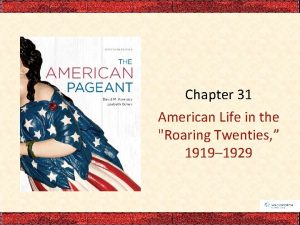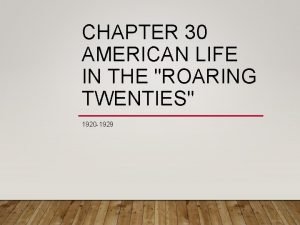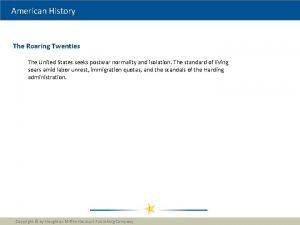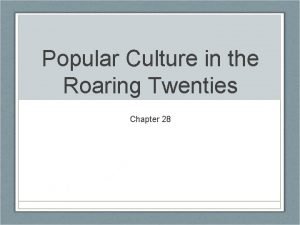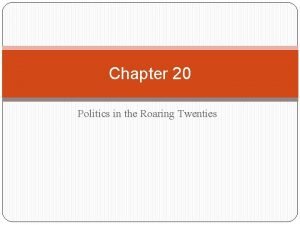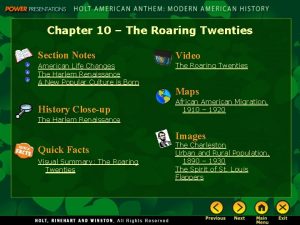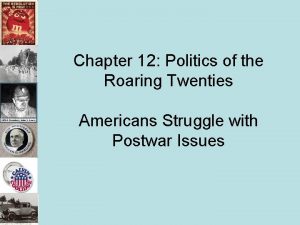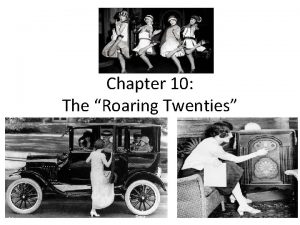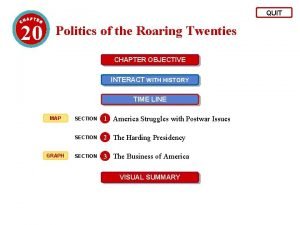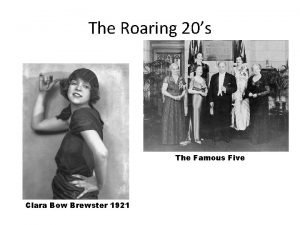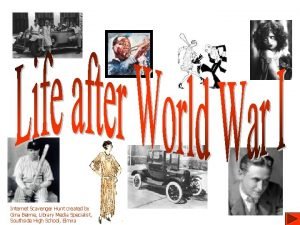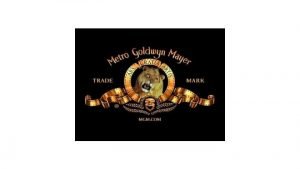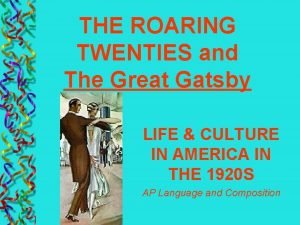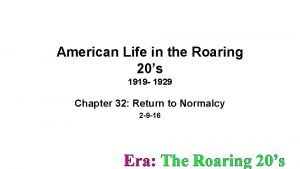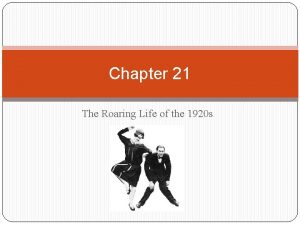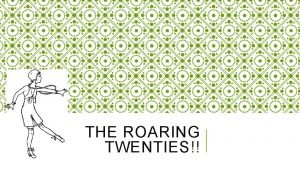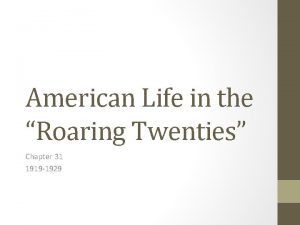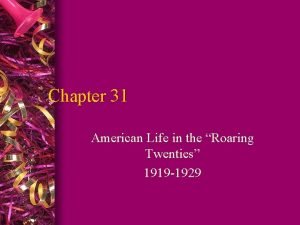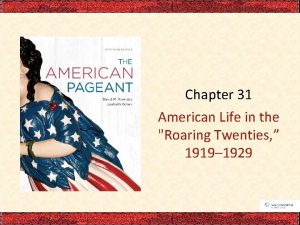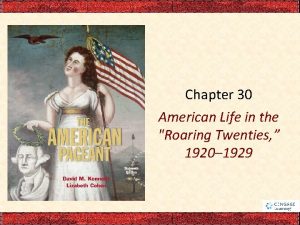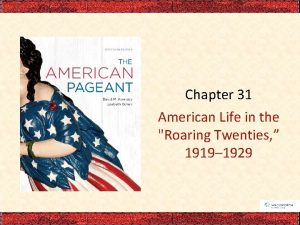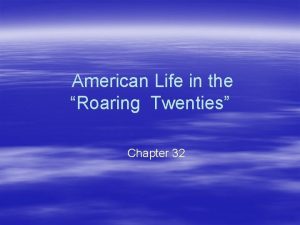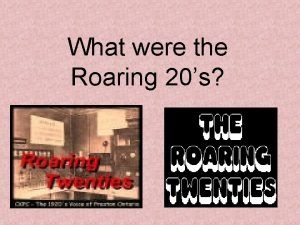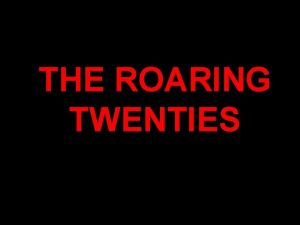Chapter 30 American Life in the Roaring Twenties
















- Slides: 16

Chapter 30 American Life in the “Roaring Twenties” 1920 -1929

The Roaring 20’s An era of prosperity, Republican power, and conflict

The 1920 s was an era of: • extreme economic growth, – an explosion of new products like the automobile. • big social changes – the changing role of women and – the emergence of popular culture and advertising. • political conservatism – a string of Republican presidents – the Red Scare that demonized all liberals and radicals

• The 1920's was known as the "Roaring 20's", or the "Jazz Age” and a “return to normalcy. ” • A period of great change in American Society - modern America is born at this time •

Seeing Red • Fears of Russia – Communism • Against American beliefs and values – Capitalism, freedom • Red Scare of 1919 and the Palmer Raids – Strikes lead to call out of federal troops – Attorney General A. Mitchell Palmer jails or deports over 6000 suspected communists – Bombs sent to prominent leaders, including Palmer – Sept. 1920 – Wall St. bombed, 38 killed

Reactions • State Legislatures – States ban advocating violent overthrow of the government – Laws used to prosecute socialists – Unions come under fire • Sacco & Vanzetti – Italian immigrants • Atheists, anarchists, draft dodgers – On April 15, 1920, two men robbed and murdered two employees of a shoe factory in Massachusetts – Convicted of murder July 14, 1921, sentenced to death • After 6 years of appeals they were executed on August 23, 1927.

The new KKK • Who are they? – Anti catholic, black, Jewish, pacifist, Communist, internationalist, evolutionist, bootlegger, gambling, adultery, birth control, etc. – Pro Anglo-saxon, “Native” American, protestant • Resembled older nativist movements • Reaction to red scare, social change, and rise of status of blacks • Mainly found in Midwest and South

The Ku Klux Klan Great increase In power Anti-black Anti-immigrant Anti-Semitic Anti-Catholic Anti-women’s suffrage Anti-bootleggers


Decline of KKK • 5 million members at height in 1925 • Appalling tactics turn off average citizens – Burning crosses, lynching, tar/feathering • Embezzlement leads to Congressional investigation

A Society in Conflict • Anti-immigrant – National Origins Act – Discrimination Sacco-Vanzetti Trial – Italian immigrants – Unfair trial

Stemming the Foreign Flood • Emergency Quota Act of 1921 – 800000 immigrants arrive from southern/eastern Europe – Restricts immigrants to 3% of people of nationality living in US in 1910 • Immigration Act of 1924 (National Origins Act) – Quota cut from 3% to 2% • Based on 1890 census – Japanese prevented from immigration – Canada/Latin America exempted – Criticized as unfair • Quota system abolished in 1965

Results of Immigration Act • • Immigration slowed 1931 – more foreigners leave America than arrive Freedom and opportunity sacrificed Labor Unions suffer – Difficulty communicating – Ethnic differences played up by factory owners • Cultural Pluralists – Favor Immigration – Horace Kallen • U. S. should be protective area where groups can preserve cultural identity – Randolph Bourne • Interaction between immigrants – Beginnings of “multiculturalism”

The Prohibition Experiment • 18 th Amendment – prohibited manufacture, sale, transport, and consumption of alcohol • Volstead Act – defines beverages and imposes penalties • Favored in South and West – Keep alcohol out of hands of blacks – End prostitution, corruption, violence • Opposed in East – Large foreign populations in cities


 Chapter 31 american life in the roaring twenties
Chapter 31 american life in the roaring twenties Chapter 30 american life in the roaring twenties
Chapter 30 american life in the roaring twenties The roaring twenties lesson 3 changing ways of life
The roaring twenties lesson 3 changing ways of life Chapter 28 popular culture in the roaring twenties
Chapter 28 popular culture in the roaring twenties Chapter 20 politics of the roaring twenties answer key
Chapter 20 politics of the roaring twenties answer key Chapter 10 the roaring twenties
Chapter 10 the roaring twenties Chapter 12 politics of the roaring twenties
Chapter 12 politics of the roaring twenties Chapter 10 the roaring twenties
Chapter 10 the roaring twenties Politics of the roaring twenties
Politics of the roaring twenties Chapter 20 politics of the roaring twenties
Chapter 20 politics of the roaring twenties The roaring twenties were characterized by -
The roaring twenties were characterized by - Roaring twenties acrostic poem
Roaring twenties acrostic poem Roaring twenties scavenger hunt answers
Roaring twenties scavenger hunt answers The roaring twenties canada
The roaring twenties canada Roaring twenties great gatsby
Roaring twenties great gatsby Roaring twenties acrostic poem
Roaring twenties acrostic poem Chapter 13 the roaring life of the 1920s
Chapter 13 the roaring life of the 1920s
